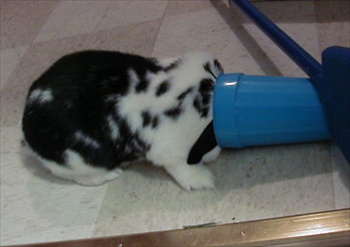House Rabbit Community and Store
What are we about? Please read about our Forum Culture and check out the Rules.
The subject of intentional breeding or meat rabbits is prohibited. The answers provided on this board are for general guideline purposes only. The information is not intended to diagnose or treat your pet. It is your responsibility to assess the information being given and seek professional advice/second opinion from your veterinarian and/or qualified behaviorist.
› FORUM › DIET & CARE › travelling with bunny
- This topic has 8sd replies, 6 voices, and was last updated 18 years, 3 months ago by
 wendyzski.
wendyzski.
-
AuthorMessages
-
-
11/09/2007 at 6:32 PM
we are a military family scheduled to move in June… we are wondering how hard it is to move with a house rabbit (Rabby is our first rabbit and we just love him)… we usually drive to our new post, which can be across the country. How traumatic is it for a rabbit? Would it be better to give him to a new family than go through the trauma of a few days trip in the car… and then a new home? We don’t want to leave him behind, but we also don’t want to scare him. Any help or tips?
-
11/09/2007 at 6:38 PM
Hello Rabby! Welcome to Binky Bunny!
I traveled from Los Angeles to Dallas with 7 rabbits, and they all made it OK. I’d highly recommend NOT leaving you rabbit behind, myself and many others here work with rescue groups, and there is an extremely low chance of your rabbit being able to live a happy healthy life if he is left behind. Shelters are overfull of rabbits, and rescue groups are overwhelmed with them, and even if you found a new family for him, you’d never really know if your companion was well cared for once your left.
There are quite a few things to keep in mind when traveling with a bunny. First of all, you’ll want to have the bunny in a carrier, and make sure that the car is cool enough for the bunny, and also keep direct sunlight off the carrier by shading it with a towel. You will want to have a small pen for the bunny to hang out in at the hotels, and fresh hay, a litterbox, a water dispenser, and pellets to let your bunny eat and drink at night. The carrier should also have hay and a water dish with just a bit of water in it. You’ll also want to bring some treats in case your rabbit gets nervous and doesn’t want to eat, so that you can entice him with some treats.
There are lots of other things I learned from this trip so I will try to remember them and post some more!
-
11/09/2007 at 10:19 PM
I also agree with Moobunnay, it’s much better to keep your bunny with you. With proper preparation and supervision while traveling, you should be okay! You’ve gotten some wonderful tips already, and I have pasted an exerpt from the HRS about traveling with your rabbit. (I took the part about driving, not flying)
To see the article in its entirety which includes air travel see http://www.rabbit.org/faq/sections/travel.html
Vacations and Travel
When traveling is in your plans, whether it be a vacation or a move, plans will need to be made for your rabbit. Rabbits have different personalities and each will react in varying degrees to stress, but you should keep in mind that most rabbits are stressed by changes–unfamiliar surroundings, changes in routine, changes in type of food/water, and changes in temperature. Rabbits show stress by getting diarrhea, becoming withdrawn or aggressive, or by refusing to eat. By planning carefully, you can minimize these stresses for your rabbit.
if you are moving, you will need to plan on moving your rabbit also. People have moved rabbits over long distances; It just takes planning ahead.
GET YOUR RABBIT USED TO CAR RIDES: If your rabbit is not used to car rides (except to the vet), start regular car rides as early as possible before your actual trip. Start with short (30 min.) weekly or twice weekly rides in a pet carrier. Try to have some longer rides (1 hr.-3hr.) before the trip. Remember! Don’t leave your rabbit in a warm car at the store.
If you are moving long-distance and are also moving several animals, you might consider renting a panel van with no partition between the driver and cargo (allows AC/Heat to circulate). Place cages on top of carpet remnants or pads to minimize vibration and secure cages to wall of van.
THINGS TO KNOW ABOUT CAR TRAVEL
1. Rabbits cannot tolerate heat.
a Provide wet towels over cage with breeze and frozen water cartons to lie against if you have no air conditioning in hot weather.
b. Don’t leave rabbit in parked car in the hottest part of the day while you are in a restaurant. You may have to get food-to-go, take food along and stop in shaded rest areas, or wait until early morning and late evening to stop to eat.
2. Rabbits do not like drafts.
Carriers should not be placed where AC/Heat blows directly on them.
3. Water bottles will often leak out all their water.
Rabbits tend to not drink while traveling. Water should be offered at all stops. Add Pedilyte to combat dehydration but be sure the rabbit will drink it. You may have to syringe/dropper feed water.
4. Rabbits may also not eat while traveling.
Offer favorite vegetables, pellets, and hay at all stops. Put some hay and pellets in carrier while traveling. 5. Try to establish some routine.
as to length of time in car each day, stopping times, feeding and exercise times
6. Strap down carriers
so they do not slide during sudden stops"Carriers
Pet Taxis/Kennel Cabs-Sturdy.
Rabbits like the solid roof. End-opening doors sometimes make it difficult to get some rabbits out; some have doors on the top but these are usually not tall enough to allow many rabbits to sit up. Solid bottoms may make it difficult to maintain a clean area for your rabbit unless you get a large carrier that will accommodates a small litter pan. It is also difficult to attach water bottles and food bowls to doors.
Rabbit carriers-Sold through rabbit supply catalogs.
These are made of cage wire, sit in a metal tray which holds litter, and have top-opening doors. Small travel water bottles are made for these carriers. Good sources are KW Cages 1-800 447~CAGE; Morton-Jones 1-800 443-5769.
Cage
A small rabbit cage or your rabbit’s regular cage is perhaps the best choice if you will be on the road for more than a day.
What To Take
water bottle/bowls
food
hay
water
newspapers
whiskbroom/dustpan
garbage bags
vinegar(for cleaning)
paper towels
Laxatone or Petromalt
for hairballs/swallowing of carpet, etc.
Acidophilus
from health food store to combat stomach upset
Enzyme powder
Prozyme-from rabbit supply catalogs or vet; also keeps stomach flora functioning.
Pedialyte
Infant rehydrating solution; comes in different flavors, important because rabbits often become dehydrated while traveling
Ice packs & towels
to soak in cool water for heat stress
Medical supplies
eye droppers or syringes for feeding, any medications
Health Certificate -May need one for your rabbit if you are traveling between countries or by plane. If traveling between countries, find out ahead of time about procedures at Customs.Quarantines could be a problem.
Prepare for Emergencies
1. "Tatoo" a telephone number of a reliable friend or relative in rabbit’s ears with a nontoxic felt marker. The ink wears off but provides temporary ID.
2. Type short notes for your purse, suitcase, and car giving emergency instructions in case of accident i.e.: phone number of person to call who knows what to do with rabbit and other instructions for rabbit.
3. Take the House Rabbit Handbook and other rabbit health information with you. Contact HRRN for handouts on medical concerns which may also be helpful to veterinarians on your trip.
4. If you need a vet, look for one with experience with "exotics" and ask about experience with rabbits, numbers seen, antibiotics (no amoxicillin/ampicillin), anesthetic (isoflurane is best), and fasting for surgery (no fasting for rabbits). Avoid emergency clinics if possible because they are often unfamiliar with rabbits and more expensive.Staying in Hotels/Motels
1. Look for ones which accept pets.
2. Ask for a room on the ground floor of motels in the back if you are not sure of pet policy.
3. Keep the rabbit in her cage except for exercise in the bathroom.
4. Hang the "Do Not Disturb" sign on the door at all times.
5. It may be risky leaving the rabbit in the motel while sightseeing due to staff reaction and stress of being alone in an unfamiliar place.
-Staying In Other Peoples’ Homes
1. Explain your rabbit’s living conditions before you visit. Will they mind an indoor rabbit? Will there be space for exercising?
2. Ask if they have allergies to animals? People who are allergic to cats may or may not be allergic to rabbits.
3. Be diligent about cleaning up after your rabbit.
SOURCE: http://www.rabbit.org/faq/sections/travel.html -
11/12/2007 at 11:22 AM
I have taken Pepper on trips from 1-5 hours away, but local bus and car, and she’s been fine. By car – I made a makeshift "pen" on the back seat (first covered with an old sheet in case of accidents), fixed in place with the seatbelts. Then I set her carrier with a towel in it, a water bottle, and her litterbox with some hay in case she wanted to nibble. She spent most of her time sitting in the litterbox. When I stopped I took half an hour and opened the windows for fresh air and sat and read, while she had a bowl of water and some greens if she wanted them (she didn’t but I wanted her to have the option).
She has stayed in several hotel rooms with me – She is very neat with her litterbox so I have found it easier to cage the wires than to cage the bunny! Leaning the pen up against the wall and/or pulling all electric and phone cords up on the desk or dresser made for no worries. I made her a traveling condo that I set in the "closet"

but she spent most of her time under the bed

during the day and dancing around on the bouncy-bed (usually around 3AM). I kept most of the hay contained by the same bedsheet and just made sure to tip the maids extra for having to vacuum up the hay after we left.
-
11/12/2007 at 11:59 AM
Thanks everyone for your responses about travelling with a bunny. I feel much more at ease now and will use all your advice! If anyone has any more hints/advice, I’m eager to hear it. Thanks again.
-
11/12/2007 at 12:06 PM
that’s so cool wendyzski… did the establishment know you had the bunny or was she a stowaway?
-
11/12/2007 at 1:44 PM
When I traveled with my bunnies – they were all “stow-aways”! I stayed in motels so that there was no lobby to go through to get to my room, and I could instead just drive right up to in front of the room. Then, as Wendyzski said, I left extra tips for the maid for cleaning up the hay that got around. I used a dog crate to put them in at night.
-
11/12/2007 at 2:45 PM
you’ve already gotten lots of great advice – but also wanted to mention there’s a site that has pet friendly hotels 🙂
http://www.petswelcome.com/ -
11/13/2007 at 9:01 AM
Once she had permission and the other was a storaway – the hotel allowed pets but with an extra fee that I was trying to avoid.
I’ve stayed in Wyndhams, Motel 6, and Extended Stays with her. For short local trips to SF conventions (I had to take her because she needed 3x daily meds for an ear infection) I make a portable litterbox from a cardboard box and a plastic bag. For longer ones, I have a spare "litterbox" (dollar store dishpan) that I had used for a foster.
-
-
AuthorMessages
- You must be logged in to reply to this topic.
› FORUM › DIET & CARE › travelling with bunny

